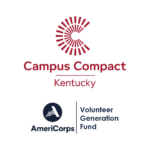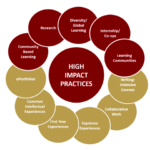KyCC Faculty Spotlight: Dr. Heather Pruss, Asst. Professor of Criminal Justice Studies, Bellarmine University
“The urgency of ensuring we prioritize community needs in this process cannot be understated.”
Dr. Heather Pruss teaches in the discipline of criminal justice – she and her students study systems built to marginalize and dehumanize people. In this disciplinary context, experiential learning has the potential to disrupt that. It requires a critical lens and real intentionality but can positively impact the community members and students.
The service-learning engagement has encouraged her to reach out, develop, and maintain relationships with community partners she may not have otherwise. Too often, academic training teaches that practitioners and scholars operate in two different worlds. “For faculty to recognize the power of collaboration opens doors for us and our partners as well as for our students and the broader community,” Dr. Pruss said.
Part of the university mission statement at Bellarmine articulates the goal of cultivating engaged and responsible citizens. Dr. Pruss takes that to heart, incorporating this into each one of her classes. Whether or not they undertake an experiential learning exercise, they ask students to think critically about social change and transformation that moves them toward a just and more equitable society, especially for folks swept into the criminal justice and related systems.
She reflected on a few experiential examples from her time at Bellarmine. This semester students in her Criminal Courts class have been working with a local nonprofit bail fund to conduct courtroom observations. The fund examines how judges interact with persons charged with crimes in court; they then collate and disseminate the information to better inform local voters. Her students will be attending virtual courtroom proceedings to help collect data and bring their own understanding of the functioning of the courtroom workgroup acquired in the classroom to bear on their observations. “Collaboratively, we can respond to the needs of our nonprofit community partner (and by extension, the community’s needs) but also deepen my students’ learning experience in the process,” said Dr. Pruss.
During a previous semester in her Research Methods course, the class collaborated with a local organization to conduct a community-based research project. The organization supports men who are unhoused and experiencing substance use issues. Dr. Pruss and her students worked to design, conduct, transcribe, and analyze qualitative interviews with men at the facility and situate their lived experiences within the existing academic literature. They presented this information back to the community partner, including residents at the facility and an academic conference.
“One student from that class who has gone on to begin his career in law enforcement tells me that during his academy training, he shared his experiences from our project with his fellow officers, and specifically how it informs his understanding of these issues,” Dr. Pruss shared. “He also described specific examples of how he has implemented this knowledge during encounters with folks in his daily patrol work—in ways that embody compassion, dignity, and a sociological lens.”
As service and experiential learning initiatives continue to grow across university campuses, Dr. Pruss would implore faculty implementing these practices to continuously reflect on how and why they do so – herself included. “The urgency of ensuring we prioritize community needs in this process cannot be understated. We must bring a critical lens to bear on our approach to this model of teaching and learning if we are to be diligent in our responses to diversity, equity, and inclusion issues facing our communities,” she explained. “Let’s make sure this work is doing what we intend it to do—for everyone involved. That is how we move toward social justice together.



